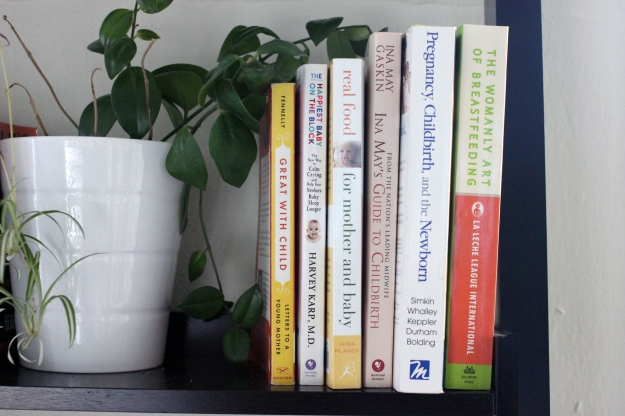I’m finishing up the last book on my pregnancy reading list and thought I’d share which books made the list and a few thoughts on each.
 Quick disclaimer: I didn’t read very many books. Up until six months, I was working full time and finishing my NTP certification. There wasn’t much extra time in my day for reading non-school books. But even more, I had little desire to read most of what is out there. I’m not into ranting, but I will say that I hate the way we view pregnancy and birth in the US. End rant. I chose to read books that support a non-pathological view of pregnancy and birth and that do not engage in expectant mother fear mongering. There are still more books that meet this criteria than I could or needed to get through in three months, so I picked a few and didn’t worry about the rest.
Quick disclaimer: I didn’t read very many books. Up until six months, I was working full time and finishing my NTP certification. There wasn’t much extra time in my day for reading non-school books. But even more, I had little desire to read most of what is out there. I’m not into ranting, but I will say that I hate the way we view pregnancy and birth in the US. End rant. I chose to read books that support a non-pathological view of pregnancy and birth and that do not engage in expectant mother fear mongering. There are still more books that meet this criteria than I could or needed to get through in three months, so I picked a few and didn’t worry about the rest.
Great With Child by Beth Ann Fennelly. This memoir is not what most people would categorize as a pregnancy book, but I loved it. It came highly recommended from one of my favorite blogs and it was a breath of fresh air to read in between the more “technical” pregnancy and birth books. The collection of letters from mentor to mentee are beautifully written and captured both the highs and lows of pregnancy as well as motherhood.
The Happiest Baby on the Block by Dr. Harvey Karp. Happiest Baby came highly recommend from several sets of parents whose parenting style we admire. Greg and I both read this book, and while it is highly repetitive (seriously, it could be twenty pages long instead of two hundred), we learned a lot. As Martian isn’t here yet I can’t comment on whether or not the techniques we learned will work for us, but having a common ground to start from on that first long night is what we were hoping to get (and got) from this book.
Real Food for Mothers and Babies by Nina Planck. Obviously this book was right up my ally. I’m not sure that I learned new information given that I was going through a nutrition program at the same time, but for someone curious about nutrition during pre-conception, pregnancy, birth, and early months of baby this is a great read. I love that the pregnancy section broke down mom and baby’s nutrient needs by trimester. I used this as a guide for taking in more nutrient appropriate foods at specific times.
Ina May’s Guide to Childbirth by Ina May Gaskin. If I had to pick one book to recommend, this would be it. I learned so much about what my body is capable of and what should be considered normal during pregnancy and birth that I feel empowered going into labor and bringing this baby into the world. I feel silly writing that sentence, but it’s true. I wouldn’t say that I feared labor and birth before, but now I am accepting of them. Again, I haven’t done it yet so the jury is out on if what I learned will be useful or not. However, just being in the mind frame that I am about the process is win enough for me.
Pregnancy, Childbirth, and the Newborn by Penny Simkin. After researching several pregnancy books, I decided to go with this one and ordered it from Amazon. Then we went to my first midwife appointment and they gave us a copy. And then we started our birth class series where they gave us a third copy (which I declined). Clearly it was the book I was meant to read. I highly recommend this book if you want a less conventional, less pathological (but not not-science based) book on what to expect during pregnancy and birth. In terms of labor and birth, this book (and our class) helped ensure that I will be a good advocate for myself and the baby. I understand the physiology behind labor and birth now as well as the risks and side effects of each potential intervention. Combined with what I learned in Ina May’s Guide, I am confident with my plans for birth but also know that if we have to deviate I’m armed with the knowledge that I need to make decisions.
The Womanly Art of Breastfeeding by Diane Wiessinger of La Leche League. I’m about halfway through the book and so far enjoying it. I’m glad I’m reading it now to get the information in my head, but I’m pretty sure it will be more heavily used as a reference in the first few weeks of baby’s life and as we come up on different milestones over time.
I’m collecting a list of parenting books I’d like to read, but I have no plans to start them anytime soon. Next up on the list is simply surviving the first six weeks with baby, which I’m not sure will involve all that much reading. But if it does, I have a few non-baby related books on my iPad ready to go.